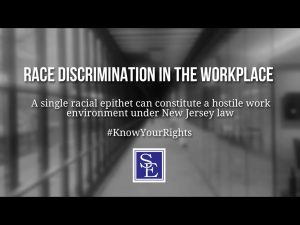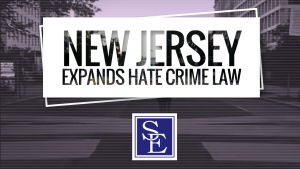While there are federal and state laws that protect employees from racial discrimination in the workplace throughout the country, these laws are not always uniform in terms of the severity or pervasive enough of the complained of conduct that constitute an actionable hostile work environment. Generally speaking, when the racially discriminatory conduct is so severe or pervasive as to change the nature of the job, a worker has grounds to bring a lawsuit for hostile work environment. But what type of conduct meets the standard for a successful claim? More specifically, can a single instance of race-based discrimination create a hostile work environment? The answer may depend on where the suit is filed. For example, in New Jersey, our courts have held that a single racial epithet can constitute a hostile work environment, while other courts outside New Jersey have adopted a strict rule that a single racial epithet, no matter how offensive, can never be enough to constitute a hostile work environment.
 Earlier this month, a judge in the federal district court for the Northern District of Alabama granted a defendant employer summary judgment against three plaintiff employees’ claims of racial discrimination and hostile work environment. In Bone v. Alliance Investment Co., LLC, Case No. 5:18-cv-01706-LCB (N.D. Ala. Oct. 8, 2020), three African American carpenters sued their employer, claiming that supervisors frequently referred to them as the n-word behind their backs and routinely assigned them more physically demanding work than their white counterparts. One plaintiff was called the n-word directly to his face and others overheard it being used. The company argued that the employees had failed to present evidence that the harassing conduct was severe or pervasive enough to alter the terms or conditions of their employment. Agreeing, the court dismissed the hostile work environment claim with prejudice.Specifically, the court found that in order to establish a hostile work environment in the Eleventh Circuit, the plaintiffs had to show that “the workplace is permeated with discriminatory intimidation, ridicule, and insult, that is sufficiently severe or pervasive to alter the conditions of the victim’s employment and create an abusive working environment.” The test for severe and pervasive conduct is both subjective and objective, meaning that the environment became what a reasonable person would find hostile or abusive as well as one that the victim subjectively perceived to be abusive. The court found that although the behavior was subjectively abusive to plaintiffs, under the totality of the circumstances, a reasonable person would not find the workplace to be hostile. Recognizing the severity of the n-word, the court still held that because the plaintiffs’ job performance was not impacted by it, their claim for hostile work environment failed as a matter of law.
Earlier this month, a judge in the federal district court for the Northern District of Alabama granted a defendant employer summary judgment against three plaintiff employees’ claims of racial discrimination and hostile work environment. In Bone v. Alliance Investment Co., LLC, Case No. 5:18-cv-01706-LCB (N.D. Ala. Oct. 8, 2020), three African American carpenters sued their employer, claiming that supervisors frequently referred to them as the n-word behind their backs and routinely assigned them more physically demanding work than their white counterparts. One plaintiff was called the n-word directly to his face and others overheard it being used. The company argued that the employees had failed to present evidence that the harassing conduct was severe or pervasive enough to alter the terms or conditions of their employment. Agreeing, the court dismissed the hostile work environment claim with prejudice.Specifically, the court found that in order to establish a hostile work environment in the Eleventh Circuit, the plaintiffs had to show that “the workplace is permeated with discriminatory intimidation, ridicule, and insult, that is sufficiently severe or pervasive to alter the conditions of the victim’s employment and create an abusive working environment.” The test for severe and pervasive conduct is both subjective and objective, meaning that the environment became what a reasonable person would find hostile or abusive as well as one that the victim subjectively perceived to be abusive. The court found that although the behavior was subjectively abusive to plaintiffs, under the totality of the circumstances, a reasonable person would not find the workplace to be hostile. Recognizing the severity of the n-word, the court still held that because the plaintiffs’ job performance was not impacted by it, their claim for hostile work environment failed as a matter of law.
The Bone case is reminiscent of a 2019 case decided by recently appointed Supreme Court Justice, Amy Coney Barrett, when she sat on the U.S. Court of Appeals for the Seventh Circuit. In Smith v. Ill. Dept. of Transportation, 936 F.3d 554 (7thCir. 2019), an employee for the Illinois Department of Transportation was fired after a probationary period of employment during which he allegedly performed quite poorly. The employee sued the Department, arguing that it had subjected him to a hostile work environment and fired him in retaliation for his complaints about racial discrimination. The Circuit Court affirmed the dismissal of his claims for failing to establish a hostile work environment as a matter of law. In his lawsuit, the employee claimed he was treated differently from other employees due to his race and his supervisor called him the n-word during a confrontation. The employee was fired two weeks after the confrontation. Addressing the hostile work environment claim, the Circuit Court found that the majority of the harassment he cited was unconnected to his race and arose from generally unpleasant and profane language that was used routinely toward all employees. The one incident, however, that plainly constituted race-based harassment was when one of his supervisors called him a “stupid ass [n-word]” after finding out that he had filed a complaint with the Equal Employment Opportunity office. The Court noted that “while there is no ‘magic number of slurs’ that indicates a hostile work environment, an ‘unambiguously racial epithet falls on the more severe end of the spectrum.’” Even still, a plaintiff cannot win a hostile work environment claim simply by proving that the word was said unless he can also show that it altered the conditions of his employment. Unlike in Bone, the Seventh Circuit Court found that the plaintiff failed to prove even his own subjective belief that being called the n-word created a hostile work environment. The court found that because his entire employment had been rocky, and by the time he was called the n-word his termination proceedings were already under way, there was no proof that the racial slur changed the always unpleasant work environment. Because he could not show that the distress he suffered from being called the n-word was distinct from the distress he suffered routinely at work, the plaintiff’s claim for hostile work environment was dismissed.
 In the case, Rios, Jr. v. Meda Pharmaceutical, Inc., the employee claims that on two separate occasions, his direct supervisor called him a “sp*c” and this conduct amounted to a hostile work environment. After he reported both instances to Human Resources (HR), the supervisor placed him on a performance improvement plan and he was eventually fired. At the end of discovery, the employer filed a motion for summary judgment to dismiss the case arguing that only two incidents were not pervasive or severe to constitute an actionable claim for hostile work environment. The trial court granted the motion and dismissed the lawsuit.
In the case, Rios, Jr. v. Meda Pharmaceutical, Inc., the employee claims that on two separate occasions, his direct supervisor called him a “sp*c” and this conduct amounted to a hostile work environment. After he reported both instances to Human Resources (HR), the supervisor placed him on a performance improvement plan and he was eventually fired. At the end of discovery, the employer filed a motion for summary judgment to dismiss the case arguing that only two incidents were not pervasive or severe to constitute an actionable claim for hostile work environment. The trial court granted the motion and dismissed the lawsuit.  New Jersey Employment Lawyers Blog
New Jersey Employment Lawyers Blog



